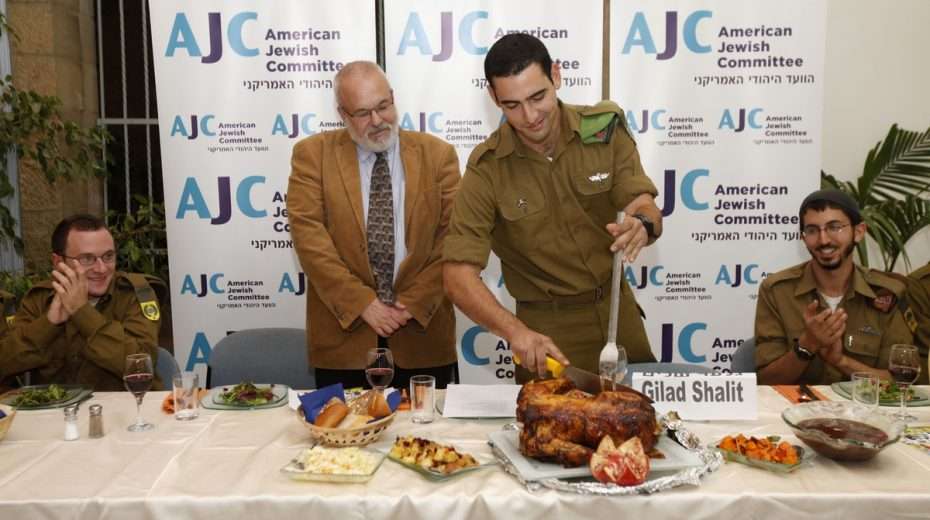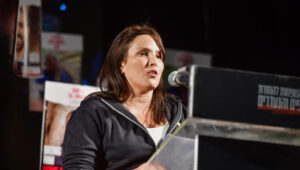An overwhelming majority of American Jews celebrate Thanksgiving, as they relate to its message of fleeing religious persecution to obtain freedom in the New World, and being grateful for what they have. As Psalm 100 proclaims:
“A song of thanksgiving offering. Shout to the Lord, all the earth. Serve the Lord with joy, come before him with praise. Know that the Lord is God; He made us and we are his, people and the flock of his pasture. Come into his gates with thanksgiving. His courtyards with praise; give thanks to him, bless his name. For the Lord is good; his kindness is forever and until generation after generation is his faith.”
Indeed, saying thank you for what you have in life is an important Jewish value. Before we eat, we say thank you. After we eat, we say thank you. In the morning when we wake up, we say thank you. We even thank the Lord after we go to the bathroom. For this reason, most American Jews also want to be part of this great festive holiday, not only for the pumpkin pie, stuffing and other tasty dishes, but because we want to thank America for granting us a warm home, which has not been the standard throughout Jewish history.
As the great Jewish American poet Emma Lazarus once wrote in honor of the creation of the Statue of Liberty in New York:
“Give me your tired, your poor, your huddled masses yearning to breathe free, the wretched refuse of your teeming shore. Send these, the homeless, tempest-tossed to me, I lift my lamp beside the golden door!”
See: Lady Liberty and the Biblical Deborah
For Jewish people on Thanksgiving, this poem has timeless relevance, as Jews have never forgotten how they fled from the pogroms of czarist Russia, the Holocaust and other instances of antisemitic violence in order to obtain freedom and liberty in the New World. There are even Orthodox Rabbis who accept the celebration of Thanksgiving, even though it is customary in the Orthodox world for Jews to not mimic Gentile customs. In their eyes, it is entirely acceptable for Jews to celebrate Thanksgiving, unlike Halloween and other American holidays of Christian origin.
Occasionally, the Jewish holiday of Hanukkah is celebrated close to Thanksgiving because every year the Jewish holidays are celebrated on different dates of the Gregorian calendar. Some Jews in the United States take advantage of the proximity between Hanukkah and Thanksgiving and combine the celebrations into one big celebration called “Thanksgivukka.” The Thanksgivukka holiday has unique children’s songs and foods that combine those of both holidays. First on Hanukkah, it is customary for Ashkenazi Jews in America to eat latkes that are made not only from potatoes and onions, but also sweet potatoes and carrots. Another dish that is common for Thanksgivukka is apple pie and cranberry jam, dishes that symbolize Thanksgiving, but with orange juice added to it, symbolizing the fact that Jews introduced oranges in Europe. American Jews of Moroccan descent have a unique dish for Thanksgivukka, a special kind of dairy couscous with butter, sugar, cinnamon, nuts and fruits, which is eaten with yoghurt. This is a traditional Moroccan Jewish food for Hanukkah. Thanksgivukka also has a special turkey-shaped menorah. The two bright symbols of these two holidays combine harmoniously into one symbol that unites two great cultures, the Jewish and the American.
The proof that Thanksgiving is important to the American Jewish community is the holding of Thanksgiving meals outside of America in Israel. As Thanksgiving is not a religious holiday, American Jews who make Aliyah theoretically do not need to continue to celebrate it. However, do so as if they were in the United States. In Israel, American Jews have adapted Thanksgiving for Israeli audiences. For example, Turkey is usually served here together with challah and hummus. In my home, we serve chicken stuffed with couscous, pumpkin, squash, chick peas, carrots, potatoes and sweet potatoes instead of turkey and stuffing, as most of the people at our table are Moroccan Jews.
Also, American Jews who serve in the Israel Defense Forces continue to celebrate Thanksgiving and are often given off a few days before the celebration, and lone soldiers, who serve here without family, are granted a special Thanksgiving dinner among other people that are far from loved ones. One of the organizers of that dinner stated that the goal was to create an American Jewish community that would combine the two identities and cultures of American Jews living in Israel.
American Jews celebrate Thanksgiving like any other Jewish holiday, it is simply part of their tradition and culture.














Excellent article. Thank you.